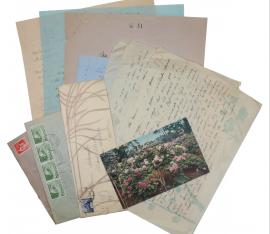Japanese-French writer (1897-1975). 5 autograph letters signed and one autograph postcard. Kyoto, Geneva, Menton, and Paris. (Oblong) 4to and postcard format. Altogether 10 pp. With 3 autograph envelopes.
$ 1,603 / 1.500 €
(88770/BN58663)
Correspondence with her publisher Maurice Delamain, his sister and collaborator Jeanne Delamain, and their publishing house Stock. The earliest letter in the collection, postmarked on 4 December 1925, was probably written from Kyoto on decorated Japanese paper: "I am returning from one of the most interesting round trips: Kyoto - Osaka - Nara - Isé. Palaces where the gardens of the 15th century still conserve cubist decorations. Workshop visits where brocade belts are woven, where my kimonos are dyed with flower extracts and underwear with molten glue.
Mass with the monks of old Mt. Hiei-zan for the Manes of my sister’s house [...] Ceremony of the saké cup with the courtesans of Gion in a brothel that is 300 years old with all the traditions; descent on the rapids between the two river banks [...] In Osaka we stuck our noses into the famous coffee houses. In Nara we saw the Shinto Vestals and the deer. In Ise [we saw] the new temples of the Mirror of the Sun [...] and walked underneath the giant cryptomerias. Finally, in Futamiura I rediscovered the phallic cult". Yamata, who would return to Europa via the Trans-Siberian Railway, announces that she will send Delamain valuable Japanese paper "to lighten my baggage", intended for special print runs of her just-published first novel "Masako" (1925) and the forthcoming novel "La Trame au Milan d'Or" that was not published until 1930. Lists of various papers are enclosed. - By the end of the month, Yamata was already in Menton on the French Riviera, from where she sent Delamain a Japanese postcard postmarked 29 December 1925. Jokingly, she writes about her holiday mishaps: a car accident on the day of her planned departure, and a flu that afflicted her. As a "remedy", she asks for the proofs of her forthcoming novel "Le Shoji", insisting that the book "will be successful if it is born at the right moment! Otherwise it will smell musty!" The postcard is signed "Masako", the title of Yamata’s first novel. - A very long and intimate letter that can be dated to between 1927 and 1930 is addressed to Jeanne Delamain. Yamata forms a narrative arch, starting the letter with a remark on an unwanted suitor of her mother and closing with the confession that she satisfied her need to talk "on your breast" since her mother "received the undesirable Mr. in my place". The letter can be dated by Yamata's mention of her novels "Shoji" (Stock, 1927) and, forthcoming, "La Trame au Milan d'Or", of which she had "lost the 10th chapter". An earthquake referenced in the letter might point the 1927 North Tango earthquake in Kyoto Prefecture. While a man named Tatsumi was badly affected by the catastrophe, Yamata seems to be distancing herself from Japan to some extent. She tells Jeanne about the French authors that she has been meeting, a long list that includes Jean Tharaud, Paul Géraldy, Guy de Pourtalès, Julien Green, Léon-Paul Fargue, and Morand. She then sets out the differences between her novels "Masako" and "Shoji" (Stock, 1927), as she was not entirely happy with the reception of the latter work. Again conflicted, Yamata goes on to emphasize her connection to old Japanese literature, even announcing her translation of the 11th century classic "The Tale of Genji" by Murasaki Shikibu, published by Plon in 1928. It is unclear whether the translation was already published at this point, but Yamata also mentions her forthcoming novel "La Trame au Milan d'Or" (Stock, 1930) because she had "lost the 10th chapter" and "clucks like a hen" for it. - In a letter to Maurice Delamain that can be dated to 1936, Yamata thanks him for giving her his reasons for rejecting a manuscript of hers. She announces that she might "reanimate the narration" when she is forty years old. - Yamata spent the war years in Japan and could not communicate with France. In a letter that reached Delamain on 5 July 1946, she asks how he and Jeanne "passed these sinister years" and relates some of her experiences of "the flight of the B-29" and "burned villages" and her relief at the end of the War. - The final letter concerns texts and invitations for an event at the gallery of the designer André Deveche. Yamata, who wrote from Geneva on 19 May 1950, thanks Delamain for his willingness to support her and asks him for a personal meeting when she is in Paris. Kikou Yamata spent the rest of her life in Geneva. - Occasional tears, pin holes and minimal browning, but well preserved overall. The 1936 letter has several tears to the lower margin but no text loss. The 1925 letter from Japan is somewhat creased and shows a rust stain from a paper clip to the first page..
